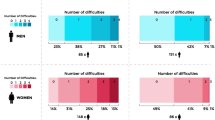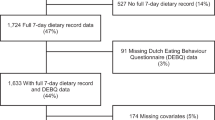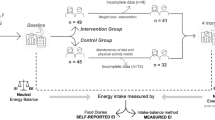Abstract
Objective: Assess the association between reporting bias of dietary energy intake and the behavioral and psychological profiles in women.
Design: At baseline a series of questionnaires were administered to 37 women, (the Marlowe-Crowne Social Desirability Scale, Weinberger Adjustment Inventory (WAI), the Eating Disorder Inventory (EDI), the Restraint Scale and Sorensen-Stunkard’s silhouettes). Subjects received training on how to record dietary records. Subjects recorded three days of dietary records to measure energy intake (EI) during a study to determine total energy expenditure (TEE) using doubly labeled water. Reporting accuracy (RA=EI/TEE×100) was determined for each subject. Statistical analysis of the data used a mixed effects model accounting for within subject variability to determine if the psychological scores were associated with reporting accuracy.
Setting and subject: Women were recruited with local advertisements in Tucson, Arizona. The women had a mean (±1 s.d.) age of 43.6±9.3 yrs, body mass index (BMI) of 28.7±8.5 kg/m2 and total body fat (%TBF) of 31.9±7.3%.
Results: Age and %TBF were significantly and inversely associated with RA. Furthermore, Social Desirability was negatively associated with RA. Body dissatisfaction and associating a smaller body size than one’s own as being more healthy were also associated with a lower RA.
Conclusions: These results suggest that Social Desirability and self image of body shape are associated with RA. Modifications in subject training may reduce the effect of these factors on RA.
Sponsorship: This project was supported by a grant from the National Institute of Diabetes, Digestive and Kidney Diseases.
This is a preview of subscription content, access via your institution
Access options
Subscribe to this journal
Receive 12 print issues and online access
$259.00 per year
only $21.58 per issue
Buy this article
- Purchase on Springer Link
- Instant access to full article PDF
Prices may be subject to local taxes which are calculated during checkout
Similar content being viewed by others
Author information
Authors and Affiliations
Contributions
Contributorship:Taren- work with overall design and analysis, Tobar- recruitment and retention of subjects. Data collection, Hill- data entry and analysis, Howell- doubly labeled water studies, Shisslak & Bell- psychological score development and Ritenbaugh- data analysis and interpretation.
Corresponding author
Rights and permissions
About this article
Cite this article
Taren, D., Tobar, M., Hill, A. et al. The association of energy intake bias with psychological scores of women. Eur J Clin Nutr 53, 570–578 (1999). https://doi.org/10.1038/sj.ejcn.1600791
Received:
Revised:
Accepted:
Published:
Issue Date:
DOI: https://doi.org/10.1038/sj.ejcn.1600791
Keywords
This article is cited by
-
The Influence of Social Desirability on Sexual Behavior Surveys: A Review
Archives of Sexual Behavior (2022)
-
Association between pre-pregnancy body weight and dietary pattern with large-for-gestational-age infants in gestational diabetes
Diabetology & Metabolic Syndrome (2019)
-
Food craving predicts the consumption of highly palatable food but not bland food
Eating and Weight Disorders - Studies on Anorexia, Bulimia and Obesity (2019)
-
The characterisation of overweight and obese women who are under reporting energy intake during pregnancy
BMC Pregnancy and Childbirth (2018)
-
Factors relating to eating style, social desirability, body image and eating meals at home increase the precision of calibration equations correcting self-report measures of diet using recovery biomarkers: findings from the Women’s Health Initiative
Nutrition Journal (2013)



